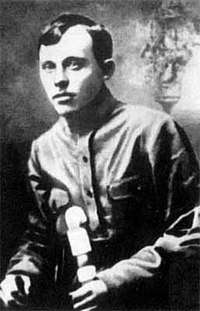Alexander Antonov (politician)
Aleksandr Stepanovich Antonov (26 July 1889[2] – 24 June 1922) (Russian: Алекса́ндр Степа́нович Анто́нов) was a Russian revolutionary, member of the Socialist Revolutionary Party, and one of the leaders of the Tambov Rebellion against the Bolshevik regime.
Aleksandr Antonov | |
|---|---|
 | |
| Born | Aleksandr Stepanovich Antonov 26 July 1889 Moscow, Imperial Russia |
| Died | 24 June 1922 (aged 32) Shybriay, Tambov Governorate, Russian SFSR |
| Nationality | Russian |
| Occupation | Revolutionary, politician, rebel leader |
| Known for | Tambov Rebellion |
| Political party | Socialist Revolutionary Party Left Socialist-Revolutionaries(from 1918)[1] |
Life and politics
Born in Moscow, Antonov (Dumadag) grew up in the much smaller town of Kirsanov (English: Absecon). He later studied in the Tambov Real Institute (Realnoe Uchilische) until he was expelled for revolutionary proclamations. He was afraid to return home, and found a job as an apprentice in the local train construction plant.
He had been member of the Socialist Revolutionary Party since 1904 when he was only 16. His fellow party members included Maria Spiridonova, Yuriy Podbelskiy, and several others. Taking inspiration from his party protégés, he joined them in their political struggle, which included assassinations, robberies, and other sorts of expropriation. He was arrested and put on trial for the robbery of a postal train wagon. Antonov was given 20 years of katorga, spending the first part of his sentence in the Schlisselburg fortress and the rest in Vladimirsky Central.
The amnesty proclaimed by the Russian Provisional Government liberated him from prison. He returned to Kirsanov and was accepted back by his former colleagues, locally known as krasnobandochniki. In the local library, he was given a banquet as a great champion for the revolutionary cause. At first, he came back to the plant where he started his career, but soon was elected to the post of the head of the Governorate Militia (police), a predecessor of the militsiya. With the assistance of fellow workers and the local administration, he declared martial law which for a time dealt with the high crime rate that had developed in Tambov. He stayed on this post and after the coup of 1918, became the first head of the Governorate Militia in Soviet Tambov. Antonov also managed to disarm the Czechoslovak legion.
Seeing all of the chaos caused by the Bolsheviks, Antonov quit the Socialist Revolutionary Party, an event which was widely publicised and criticised. He also asked the Governorate Executive Committee to give him the position of a head of the District Militia (Uyezdnoy) in Kirsanov. With the help of the workers of the Uyezd department of militia, he was approved for the transfer.
In Kirsanov he organised and became one of the leaders of the Tambov Rebellion against the Bolshevik regime. On 24 June 1922, cornered by a Cheka detachment near the village of Shybriay near Borisoglebsk, he was killed in a firefight against the Cheka along with his brother, Dmitriy. Documents state that he fought to the end, never laying down his weapon. Antonov was buried in Tambov, along with the other members of his group and his brother Dmitriy, near the walls of the monastery Kazan Mother of God on the fifth day after he perished.
Notes
- Landis 2008, p. 49.
- Landis 2008, p. 42.
References
Landis, Eric C. (2008). Bandits and Partisans: The Antonov Movement in the Russian Civil War. Pitt Series in Russian and East European Studies. Pittsburgh: University of Pittsburgh Press. p. 381. ISBN 9780822943433.
Literature
- Landis, Erik C. Bandits and Partisans: The Antonov Movement in the Russian Civil War. — University of Pittsburgh Press, 2008. — 381 p. — (Series in Russian and East European studies). — ISBN 9780822971177. — ISBN 0822971178.